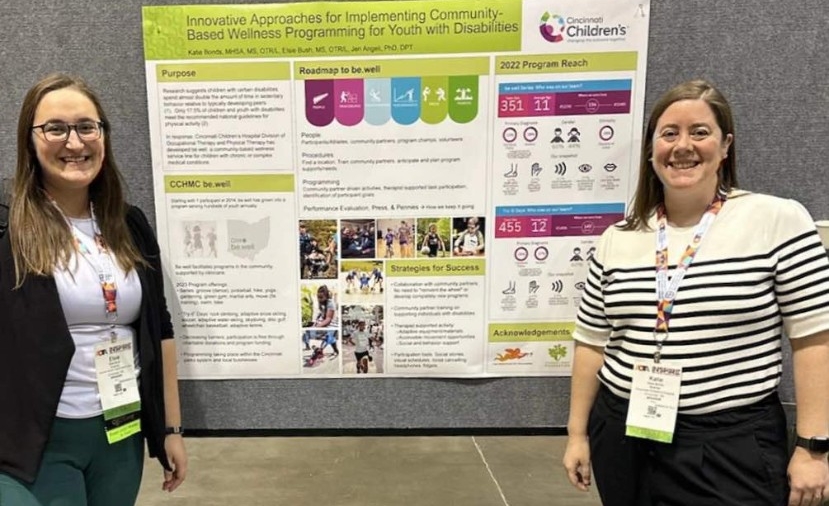Elsie Bush
We sat down with Elsie - a student in the Health and Rehabilitation Ph.D. program at UC. She shared her experience and gave some advice for future students.

Elsie Bush presenting at the AOTA Conference.
What do you enjoy doing outside of class, schoolwork, or clinical?
To relax from my work and school schedules, I am often checking out new places in the area with my dog or friends. I moved to Cincinnati five years ago, and I love always having something new to check out.
When did you know you wanted to be an Occupational Therapist?
I first learned about occupational therapy from the results of my middle school career aptitude test, however I didn't put much thought towards pursuing it as a career at that point. I later revisited the idea of becoming an occupational therapist while I was in high school and exploring careers in health care. In high school I was involved in coursework focused on learning about developmental disabilities, which also had service learning through assisting teachers in special education classrooms across our district. In this class I learned how much I loved supporting children take on new challenges. I re-visited the idea of becoming an occupational therapist because I realized that it would offer me the chance to support children in learning new skills and living fulfilling lives.
What made you decide to get your PhD in Health and Rehabilitation Sciences at UC?
As an outpatient occupational therapist at Cincinnati Children's, I put high value in providing care to patients that is evidence-based and informed by research. Through my role at Cincinnati Children's, I am involved in research and specialty care in the areas of brain based visual impairment and prenatal opioid exposure, which are two areas that are lacking in research to guide occupational therapy practice. I was motivated to start the Health and Rehabilitation Science PhD program at UC because of its goal of producing future researchers that are knowledgeable of all aspects of research including study design, management, and data analysis. I believe the skills learned in this program can help me address the gaps of knowledge that exist in my areas of clinical specialty.
What types of hands-on experiences have you been able to gain in the program?
As I enter my second year as a part-time student in the PhD program, I have found that my early coursework has laid a great foundation for me to continue advancing my research skills for my future dissertation work, but also my research work through the hospital. In our first two semesters we participated in coursework related to data analysis which showed us comprehensive approaches to look at study data and understand their meaning. I have already been able to use the skills learned in this class to run statistical analyses on data from a prenatal opioid exposure research clinic I am involved with at Cincinnati Children's and present these findings at a national conference and submit a manuscript for publication alongside my colleagues.
How have opportunities in this program shaped your career goals or view of the profession?
So far what I have learned in the program has positively influenced my ability to contribute towards research projects in my current role. My perception of the program is that the coursework is set up to help develop skills in research that will support future competence to lead projects and serve as a resource for others. Through involvement in this program, I hope to build my individual capacity to conduct research, and then use those skills to influence knowledge within the field of OT.
What impact do you hope to have in the lives of your patients or in your field?
As a clinician working in areas that are under-studied and lack representation, I am often faced with families that have frustration over not having a clear pathway for their child's recovery and clinical care. My hope is that my future work will improve knowledge for these understudied populations and improve patient and family experience as they navigate their rehabilitation journey.
Is there anything else you would say to prospective students trying to find the right program for them?
I would advise prospective students to take their time exploring their options as they look into a potential PhD program. I found it really helpful to connect with multiple faculty within the program to discuss the goals of the program, curriculum, and see if it would be a good fit for myself.